Super-Toys Last All Summer Long (1969)
Works

Hothouse
Brian W. AldissFamous Brian W. Aldiss Quotes
Super-Toys Last All Summer Long (1969)
Super-Toys Last All Summer Long (1969)
Super-Toys Last All Summer Long (1969)
Super-Toys Last All Summer Long (1969)
Brian W. Aldiss Quotes about life
Source: Greybeard (1964), Chapter 3 “The River: Swifford Fair” (p. 75)
“Man on Bridge” p. 87
Short fiction, Who Can Replace a Man? (1965)
“Exactly.”
“Man on Bridge” p. 89
Short fiction, Who Can Replace a Man? (1965)
Let's Be Frank (1957)
Brian W. Aldiss Quotes about thinking
“Basis for Negotiations” p. 124
Short fiction, Who Can Replace a Man? (1965)
"The Deceptive Truth", The Dark Sun Rises (2002)
“Poor Little Warrior!” p. 78
Short fiction, Who Can Replace a Man? (1965)
“Man on Bridge” p. 88
Short fiction, Who Can Replace a Man? (1965)
Brian W. Aldiss: Trending quotes
“An overcrowded world is the ideal place in which to be lonely.”
Super-Toys Last All Summer Long (1969)
Super-Toys Last All Summer Long (1969)
Brian W. Aldiss Quotes
Super-Toys Last All Summer Long (1969)
Super-Toys Last All Summer Long (1969)
Locus interview (2000)
Context: My wife Margaret and I sold our house to Sir Roger Penrose and his wife... Talking to Roger, I found we both agreed that AI, as they call it, is not going to be achieved by present-day machines."Artificial Intelligence" — that makes it sound simple, but what you're really talking about is artificial consciousness, AC. And I don't think there's any way we can achieve artificial consciousness, at least until we've understood the sources of our own consciousness. I believe consciousness is a mind/body creation, literally interwoven with the body and the body's support systems. Well, you don't get that sort of thing with a robot.
“There is only the pattern; the pattern is all the universe, creator and created.”
“Old Hundredth” p. 162 (originally published in New Worlds Science Fiction #100, November 1960)
Short fiction, Who Can Replace a Man? (1965)
Context: When the first flint, the first shell, was shaped into a weapon, that action shaped man. As he molded and complicated his tools, so they molded and complicated him. He became the first scientific animal. And at last, via information theory and great computers, he gained knowledge of all his parts. He formed the Laws of Integration, which reveal all beings as part of a pattern and show them their part in the pattern. There is only the pattern; the pattern is all the universe, creator and created.
Outside (1955)
Context: The house was a rambling affair. It had few windows, and such as there were did not open, were unbreakable and admitted no light. Darkness lay everywhere; illumination from an invisible source followed one's entry into a room — the black had to be entered before it faded. Every room was furnished, but with odd pieces that bore little relation to each other, as if there was no purpose for the room. Rooms equipped for purposeless beings have that air about them.
“Old Hundredth” p. 162 (originally published in New Worlds Science Fiction #100, November 1960)
Short fiction, Who Can Replace a Man? (1965)
Context: When the first flint, the first shell, was shaped into a weapon, that action shaped man. As he molded and complicated his tools, so they molded and complicated him. He became the first scientific animal. And at last, via information theory and great computers, he gained knowledge of all his parts. He formed the Laws of Integration, which reveal all beings as part of a pattern and show them their part in the pattern. There is only the pattern; the pattern is all the universe, creator and created.
The Glass Forest (1986)
Context: Plato would have no actors in his republic, in case pretence devoured what was real. Plato's fears have proved well-grounded. Actors, despised, almost outcast, until last century, have become something more than respectable. They, together with all those imitation actors, pop stars, TV celebrities, people who are famous for being famous, now receive adulation. They are the millionaires, the courtesans of our system. Solzhenitsyn, escaping to a West he had once admired, snarled at the meretricious falsity of what he found. We have built illusions round us and see no way out of the glass forest.
"Apéritif" in Bury My Heart at W.H. Smith's (1990)
Context: Writers must fortify themselves with pride and egotism as best they can. The process is analogous to using sandbags and loose timbers to protect a house against flood. Writers are vulnerable creatures like anyone else. For what do they have in reality? Not sandbags, not timbers. Just a flimsy reputation and a name.
Let's Be Frank (1957)
Context: The ambition of the original Frank had not died; it had grown subtler. It had become a wish to sample everything. The more bodily habitations there were with which to sample, the more tantalizing the idea seemed: for many experiences, belonging only to one brief era, are never repeated, and may be gone before they are perceived and tasted.
“Frank's chromosome conquered everywhere. Peace was guaranteed.”
Let's Be Frank (1957)
Context: Frank's chromosome conquered everywhere. Peace was guaranteed.
By the end of another century's ruthless intermarriage, Russia and Asia were engulfed as thoroughly as Europe, and by the same loving methods. Billions of people: one consciousness.
The Glass Forest (1986)
Context: Here is what I wrote about SF. If it has a familiar ring, my publishers liked it well enough to make it into a postcard for publicity purposes. 'I love SF for its surrealist verve, its loony non-reality, its piercing truths, its wit, its masked melancholy, its nose for damnation, its bunkum, its contempt for home comforts, its slewed astronomy, its xenophilia, its hip, its classlessness, its mysterious machines, its gaudy backdrops, its tragic insecurity.'
Science fiction has always seemed to me such a polyglot, an exotic mistress, a parasite, a kind of new language coined for the purpose of giving tongue to the demented twentieth century.
Locus interview (2000)
Context: Why do so many people dislike science fiction? The answer goes like this: You have to think of science fiction in contrast to its nearest competitor, heroic fantasy. In heroic fantasy, by and large, things are pretty stable, and then some terrible evil comes along that's going to take over the world. People have to fight it. In the end they win, of course, so the earth is restored to what it was. The status quo comes back. Science fiction's quite different. With science fiction, the world's in some sort of a state, and something awful happens. It may not be evil, it may be good or neutral, just an accident. Whatever they do in the novel, at the end the world is changed forever. That's the difference between the two genres — and it's an almighty difference! And the truth is science fiction, because we all live in a world that's changed forever. It's never going to go back to what it was in the '60s or the '70s or the '30s, or whatever. It's changed.
“We have built illusions round us and see no way out of the glass forest.”
The Glass Forest (1986)
Context: Plato would have no actors in his republic, in case pretence devoured what was real. Plato's fears have proved well-grounded. Actors, despised, almost outcast, until last century, have become something more than respectable. They, together with all those imitation actors, pop stars, TV celebrities, people who are famous for being famous, now receive adulation. They are the millionaires, the courtesans of our system. Solzhenitsyn, escaping to a West he had once admired, snarled at the meretricious falsity of what he found. We have built illusions round us and see no way out of the glass forest.
Let's Be Frank (1957)
Context: It was extraordinary to be in two places at once, doing two different things — extraordinary, but not confusing. He merely had two bodies which were as integrated as his two hands had been.
Let's Be Frank (1957)
Context: These people, scattered all over the country, a few of them on the continent, were much like normal people. To outsiders, their relationship was not apparent; they certainly never revealed it; they never met. They became traders, captains of ships that traded with the Indies, soldiers, parliamentarians, agriculturists; some plunged into, some avoided, the constitutional struggles that dogged most of the seventeenth century. But they were all — male or female — Franks. They had the inexpressible benefit of their progenitor's one hundred and seventy-odd years' experience, and not only of his, but of all the other Franks. It was small wonder that, with few exceptions, whatever they did they prospered.
Outside (1955)
Context: "There's a way outside. We're — we've got to find out what we are." His voice rose to an hysterical pitch. He was shaking Calvin again. "We must find out what's wrong here. Either we are victims of some ghastly experiment — or we're all monsters!"
Let's Be Frank (1957)
Context: These people, scattered all over the country, a few of them on the continent, were much like normal people. To outsiders, their relationship was not apparent; they certainly never revealed it; they never met. They became traders, captains of ships that traded with the Indies, soldiers, parliamentarians, agriculturists; some plunged into, some avoided, the constitutional struggles that dogged most of the seventeenth century. But they were all — male or female — Franks. They had the inexpressible benefit of their progenitor's one hundred and seventy-odd years' experience, and not only of his, but of all the other Franks. It was small wonder that, with few exceptions, whatever they did they prospered.
Quoted in the Manchester Guardian (31 December 1977), and Simpson’s Contemporary Quotations (1988) https://web.archive.org/web/20000709051930/http://www.bartleby.com/63/90/4790.html edited by James B. Simpson; Says Who?: A Guide To The Quotations Of The Century (1988) by Jonathon Green, p. 17 http://books.google.com/books?id=xUwOAQAAMAAJ&q=%22When+childhood+dies,+its+corpses+are+called+adults%22&dq=%22When+childhood+dies,+its+corpses+are+called+adults%22&hl=en&sa=X&ei=KZO4U_WwFJSlqAaquoKoCg&ved=0CK0BEOgBMBk and The Concise Columbia Dictionary of Quotations (1989), p. 45 http://books.google.com/books?id=bs0J36MpieIC&pg=PA45&dq=%22When+childhood+dies,+its+corpses+are+called+adults%22&hl=en&sa=X&ei=KZO4U_WwFJSlqAaquoKoCg&ved=0CEkQ6AEwBw#v=onepage&q=%22When%20childhood%20dies%2C%20its%20corpses%20are%20called%20adults%22&f=false
“Civilisation is the distance that man has placed between himself and his own excreta.”
Source: The Dark Light Years
“-""Expansion to your ego, friend"".
-""At your expense"".”
Variant: Expansion to your ego, friend.
-At your expense.
“Poor Little Warrior!” p. 80
Short fiction, Who Can Replace a Man? (1965)
“If adolescence did not exist it would be unnecessary to invent it!”
“Poor Little Warrior!” p. 78
Short fiction, Who Can Replace a Man? (1965)
“The only sort of tasks worth being set were impossible ones.”
“A Kind of Artistry” p. 175 (originally published in The Magazine of Fantasy & Science Fiction, October 1962)
Short fiction, Who Can Replace a Man? (1965)
“Who Can Replace a Man?” p. 19 (originally published in Infinity Science Fiction, June 1958)
Short fiction, Who Can Replace a Man? (1965)
“You are like all cruel men, sentimental; you are like all sentimental men; squeamish.”
“Poor Little Warrior!” p. 80
Short fiction, Who Can Replace a Man? (1965)
“Obeying an inalienable law, things grew, growing riotous and strange in their impulse for growth.”
Source: Hothouse (1962), Chapter 1 (first line)
Outside (1955)
“At least the mentor’s point was made: loneliness was psychological, not statistical.”
“Old Hundredth” p. 163
Short fiction, Who Can Replace a Man? (1965)
“Never, never let action become a substitute for thought.”
“Basis for Negotiations” p. 121 (originally published in New Worlds Science Fiction #114, January 1962)
Short fiction, Who Can Replace a Man? (1965)
“Science fiction is no more written for scientists than ghost stories are written for ghosts.”
Penguin Science Fiction (1961) Introduction
Source: Greybeard (1964), Chapter 3 (p. 91)
“Man was an accident on this world or it would have been made better for him!”
Source: Hothouse (1962), Chapter 18
“One of the characteristics of age was that all avenues of talk led backward in time.”
Source: Greybeard (1964), Chapter 1 “The River: Sparcot” (p. 21)
Source: Hothouse (1962), Chapter 22
“I’ve no objection to morality, except that it’s obsolete.”
Source: Greybeard (1964), Chapter 4 (p. 122)
“However you envisage your role in life, all you can do is perform it as best you can.”
Source: Greybeard (1964), Chapter 7 (p. 203)
Source: Greybeard (1964), Chapter 4 (p. 112)
Let's Be Frank (1957)
“In the extraordinary ancestral compost heap of your unconscious mind, I have burrowed too long.”
Source: Hothouse (1962), Chapter 23
Outside (1955)
Outside (1955)
“Man on Bridge” p. 89
Short fiction, Who Can Replace a Man? (1965)
“Carnage added to carnage does not equal peace.”
“Basis for Negotiations” p. 152
Short fiction, Who Can Replace a Man? (1965)
"In Conversation: Brian Aldiss & James Blish" in Cypher (October 1973)
Locus interview (2000)


